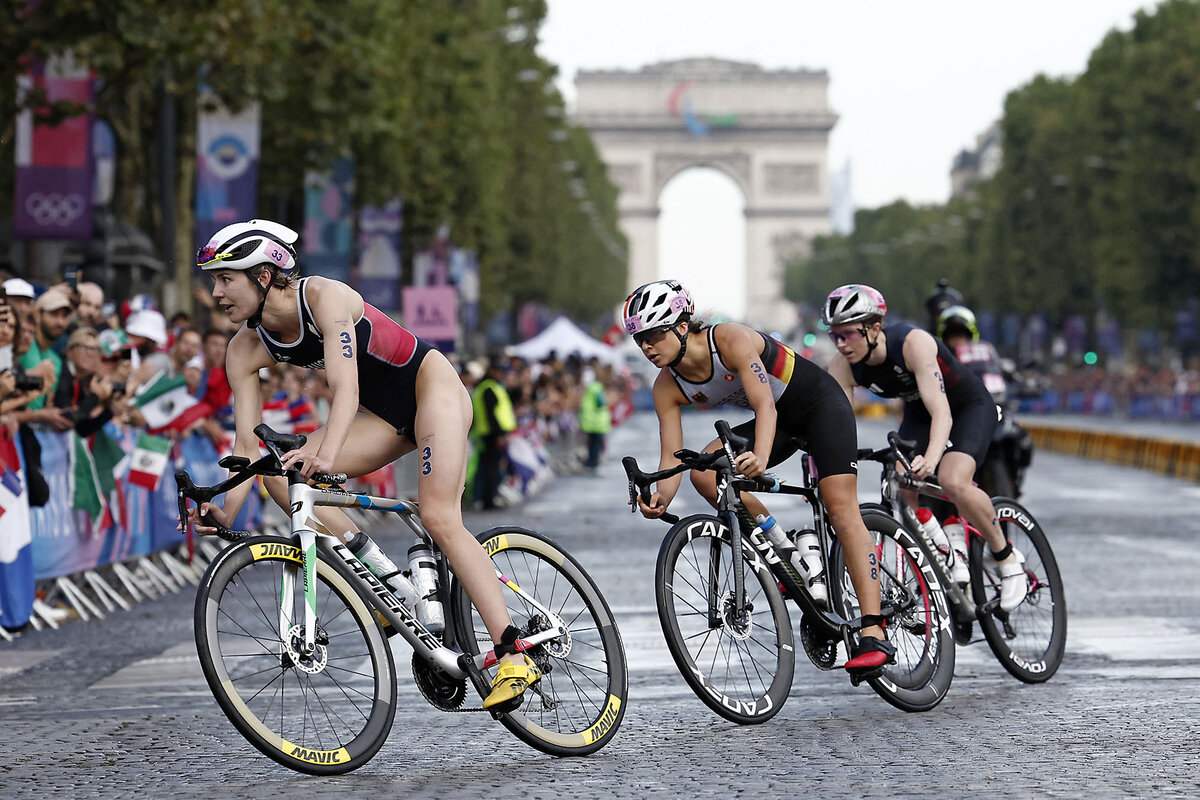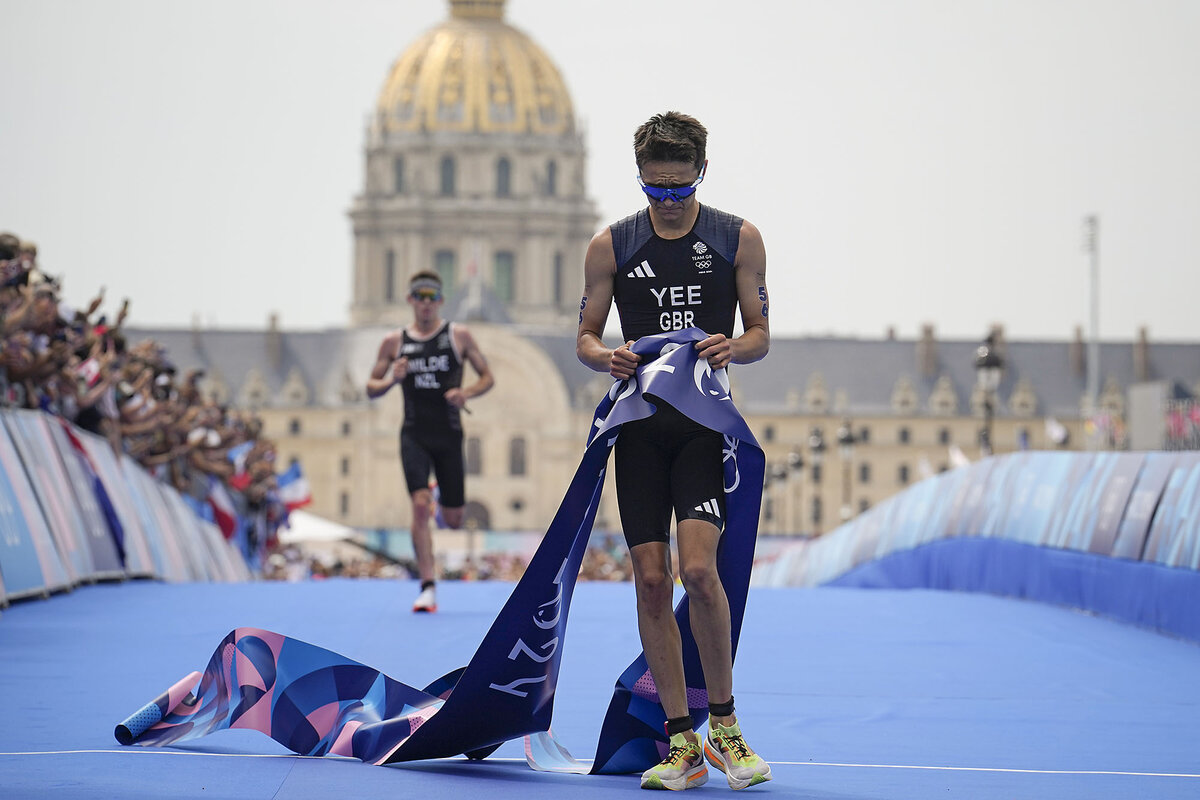With the Seine open for business, Olympic triathletes dive in
Loading...
| Paris
Their bikes skidded and slipped, some fell in muddy puddles, and the Seine’s current threatened to push them off course. But as Wednesday’s triathletes looped around Paris in their final run, they were just happy to be competing.
The day before, organizers’ worst fears were realized. After two days of heavy rainfall, pollution levels were above the legal threshold. At 4 a.m., after eating breakfast and getting dressed, athletes were told their event had been postponed.
Why We Wrote This
A story focused onParis organizers were determined to pull off something no one had done in a century: make the Seine swimmable. After delays, in which athletes found themselves at the mercy of the weather and the host city’s ambitions, the triathlon was on.
Paris has poured $1.5 billion into cleaning up its river. But Tuesday’s fiasco raises questions about organizers’ insistence on holding the swimming portion in a body of water that has not been swimmable for 100 years.
Wednesday’s triathlon – which saw athletes swimming down Paris’ most iconic waterway, and biking and running alongside the city’s most famous monuments – will, in the end, go down in the history books. France’s Cassandre Beaugrand won gold in front of a thrilled home crowd, and Alex Yee of Great Britain topped the podium for the men.
Still, one important question remains. What did the water in the Seine taste like?
“I think I can grab you a cup,” U.S. triathlete Taylor Knibb told the media, “if you want to taste it.”
Their bikes skidded and slipped, some fell in muddy puddles, and the Seine’s current threatened to push them off course. But as Wednesday’s triathletes looped around Paris in their final run, they were just happy to be competing.
The day before, organizers’ worst fears were realized when, after two days of heavy rainfall over the weekend, tests came back showing pollution levels in the Seine above the legal threshold. At 4 a.m. on Tuesday, after eating breakfast and getting dressed, athletes were told that their event had been postponed.
“The [athletes] went back to sleep, even if it was difficult since they had already prepared for the race,” Benjamin Maze, the French Triathlon Federation technical director, told reporters on Tuesday. “They’re obviously disappointed and angry. We have to deal with these emotions.”
Why We Wrote This
A story focused onParis organizers were determined to pull off something no one had done in a century: make the Seine swimmable. After delays, in which athletes found themselves at the mercy of the weather and the host city’s ambitions, the triathlon was on.
On Wednesday, bacteria levels in the Seine were deemed satisfactory, and despite rain overnight that left the streets slick, the women’s and men’s races were allowed to proceed. But Tuesday’s fiasco is a reminder of how reliant Olympic triathletes are on the weather. It also raises questions about organizers’ insistence on holding the swimming portion of the event in a body of water that has not been swimmable for 100 years.
“There is a pride in showing off Paris and French history, and the Olympics were the time to do that,” says Pierre Bréchon, professor emeritus of political science at Sciences Po Grenoble. “I think organizers wanted the Paris Olympics to be one of grandiose innovation, even if that meant taking a few risks.”
How much did Paris spend to clean up the Seine?
The city of Paris has poured €1.4 billion ($1.5 billion) into cleaning up the Seine since it was named the host of the 2024 Olympics, building a megabasin near the Austerlitz train station to filter wastewater before it ends up in the river. But as recently as July 17, when Paris Mayor Anne Hidalgo took a dip in the river to prove its cleanliness, there have been questions about whether it would be safe to swim in.
Wednesday’s event went off without a hitch, with France’s Cassandre Beaugrand winning gold in front of a thrilled home crowd and Alex Yee of Great Britain topping the podium for the men. But there is no guarantee that hygiene levels will remain stable throughout the Olympic Games. The mixed relay triathlon is Aug. 5, and the 10-kilometer (6.2-mile) open-water marathon will take place on Aug. 8 and 9. Despite the filtering systems in place, much will depend on the weather. The city takes water samples every day, but it takes 48 hours for bacteria to show up.
The situation has invariably angered some athletes who, on Tuesday, risked having the swimming portion removed from their race. That would have meant a run, bike, run competition, changing the optics of who was at an advantage. The plan B for the marathon swim could see the event take place at the Vaires-sur-Marne Nautical Stadium, where the canoe and rowing events are being held.
So why take such a risk when so much hinges on the weather? Members of Paris City Hall were visibly relieved during a press conference on Wednesday after the triathlon had successfully finished, but they say they were always fairly certain it was going to work out.
“We were not worried because as soon as we decided to take the gamble, we started putting a concrete plan in place,” says Antoine Guillou, deputy mayor of Paris, who is in charge of waste reduction and management. He says the city has spent eight years on its Plan Baignade, a project to make the Seine swimmable. “That’s why we were so confident. We knew that if bacteria levels went up, they would eventually come back down.”
If the French weren’t known as risk-takers before, they could make a name for themselves now. President Emmanuel Macron held snap legislative elections just one month before the Olympic Games, which have left the country with a hung Parliament and a caretaker government. And the Paris Olympics became the first in history to hold an open-air opening ceremony, creating a massive and costly security effort.
So, how was the water?
While the rain-drenched opening ceremony may have threatened to dampen the Olympic spirit, it was no match for Paris’ enthusiasm for the Games. Wednesday’s triathlon – which saw athletes swimming down Paris’ most iconic waterway, and biking and running alongside the city’s most famous monuments – will, in the end, go down in the history books. Tuesday’s postponement will likely become just an asterisk.
Still, one important question remains. What did the water in the Seine taste like on race day?
“I think I can grab you a cup,” U.S. triathlete Taylor Knibb told the media after a grueling two-hour race, “if you want to taste it.”
How do athletes cope with the pressure of competition? Find out more: They stepped away for mental health. Their comebacks are powering the Olympics.










